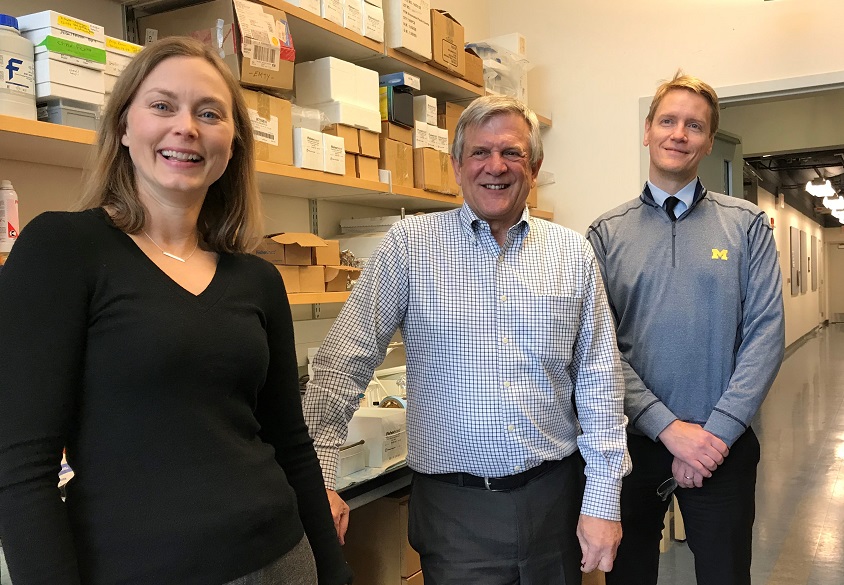A team of U-M researchers is launching a new study to better understand autoimmune skin diseases and why some people respond better than others to treatment. In the process, they aim to derive new knowledge about the immune response that could lead to more targeted, personalized therapies for a wider array of disorders.
Dubbed PerMIPA, the study is the first to be funded as a Taubman Institute Innovation Project – a new grants program by the U-M’s A. Alfred Taubman Medical Research Institute. The Taubman Institute provides unrestricted money for physician-researchers at U-M to follow their hunches into lines of research without the red tape hurdles of government and other financial sources.
About 40 research teams applied for the first round of innovation grants this year when the program launched, said Taubman Institute director Charles F. Burant, MD, PhD, who announced funding for PerMIPA was announced this fall.
“I’m really thrilled that our first TIIP grant is going to these talented investigators,” said Burant.
“As Taubman Emerging Scholars, they already have impressed me with their thoughtfulness and determination,” he said. “They already have advanced our understanding of autoimmune skin diseases and now they will apply that knowledge to figure out why some people relapse when others don’t. We really feel that this project will make a significant difference in the care of patients.”
The Taubman Institute Innovation Projects – or TIIPs for short – aim to take research to the clinics, involving more patients and health care providers in the research process. TIIPs also encourage multi-disciplinary science, with teams drawing expertise from throughout the university in fields such as engineering and infomatics.
PerMIPA is headed by Michelle Kahlenberg, MD, PhD and Johann Gudjonsson, MD, PhD, each of whom are prior recipients of the Taubman Emerging Scholar grants that help junior medical school faculty establish their research programs. Both physicians care for patients at Michigan Medicine in addition to running their laboratories and serving as faculty at the U-M medical school.
Alex Tsoi, PhD, a dermatology assistant professor and expert in biostatistics and computational analysis, also serves on the leadership team. Collectively, these three investigators have published eight peer-reviewed manuscripts in just the past three years on the molecular development of inflammatory skin disorders.
Kahlenberg is a rheumatologist who investigates lupus, a systemic autoimmune disease that occurs when the body’s immune system attacks its own tissues and organs. Gudjonsson is a dermatologist who specializes in autoimmune skin diseases such as psoriasis.
“With this funding, we will transform our knowledge about systemic and cutaneous autoimmune diseases and set a path towards personalized medicine for these patients,” said Kahlenberg. “The vision of the Taubman Institute to identify a need for this type of work is remarkable, and the support it is providing for this groundbreaking program is crucial to this transformation of healthcare.”
Hundreds of patients being seen at U-M clinics for lupus and psoriasis will be invited to join the study by providing tissue and blood samples, and detailed medical histories, at various points in their treatment.
Similar samples from healthy control subjects will be obtained. The scientists will observe how the skin diseases progress in various cohorts, and the differences in how they respond to medication and other treatment.
The tissue will be analyzed in a variety of ways:
• At the cellular level, skin and blood cells will be stimulated with common triggers of inflammation in order to assess individual patient responses and how this may change with various treatments
• At the genetic level, DNA profiling will help to link genetic risks with disease and drug responses
• At the molecular level, state-of-the-art methods like mass cytometry imaging and single cell RNA sequencing will provide detailed information on inflammatory responses
Support staff members ranging from data analysts and technicians to clinical study coordinators are being assembled now, along with the purchase of resources ranging from computer data storage to freezers for the biological samples. Patients and control subjects will be enrolled over the next few months, with an initial small cohort recruited for test runs that will allow the researchers to refine the study protocol.
PerMIPA leaders hope to attract other grants or industry support to expand this five-year study to other autoimmune or inflammatory diseases.
“This incredible support by the Taubman Institute will allow us to take steps towards addressing how factors such as age, genetics, gender and race affect the immune system and how these factors affect the course and treatment responses in our patients,” said Gudjonsson.
“It will establish and accelerate a foundation for a personalized approach for the treatment of autoimmune disorders, and revolutionize our capabilities to manage patients with these devastating and frequently challenging diseases.”
About PerMIPA: The study’s acronym stands for “Personalized medicine through integration of immune phenotypes in autoimmune skin diseases.”
To volunteer for PerMIPA, please call Rewaa Yas in the rheumatology department at (734) 936-3257 or the dermatology clinical research team at (734) 936-4070.
For more information about TIIPs grants, visit TaubmanInstitute.org






